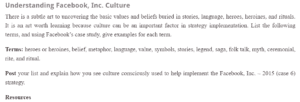Understanding Facebook, Inc. Culture
Every business entity has a unique organizational culture. Internal and external factors shape the culture of an organization and influence the strategy formulation for the company. Cultural products are dimensions of culture that can be used by a business to influence strategy formulation, implementation, and evaluation (David & David, 2017). The following are definitions of cultural products as they apply to the culture of Facebook, Inc.
Heroes or heroines: These terms refer to individuals who are greatly respected. Mark Zuckerberg can be regarded as a hero at Facebook. As the founder of the company, his views are highly respected by the company’s employees.
Belief: This refers to an understanding of a certain phenomenon. Facebook believes in its ability to use its platform to help people stay connected with friends and family. The company also believes that it can help people from around the world to stay connected.
Metaphor: These refer to shorthand words that are used to capture the image of the company, including the vision or values shared by people in an organization. Facebook’s metaphor can be seen as “Move Fast and Break Things.” This was the company’s tagline for a long time. Hence it is viewed as a representation of the company’s image.
Language: The way in which the members of a group communicate. Facebook has several subsidiaries, such as Facebook France and Facebook Brazil, which use different languages to capture the local cultural markets.
Value: Attitudes that act as guidelines for behavior. Facebook’s values are defined in its code of conduct. The company’s employees are expected to act honestly, ethically, and lawfully.
Symbols: An item that is used to convey meaning. Facebook has a blue symbol that is used to signify its business and online platform. This is the symbol that all customers connect to the image of the company.
Stories: Narratives that are often based on true occurrences. Facebook’s story is its launching by Mark Zuckerberg and his college roommates. The site was originally made for university students but grew to become a global site.
Legend: Narratives of amazing events which are not usually supported by facts. Facebook’s legend is that of Mark Zuckerberg’s dropping out of an Ivy League school to manage Facebook. This is seen as a legendary story because, usually, a school dropout is viewed as a failure.
Saga: Historical narratives of the unique accomplishments of a given group and its leaders. Facebook’s Saga is the story of its growth to be the largest social media company today. This company was started just as a small university social networking site, but today boasts of millions of users per day.
Folk talk: These can be defined as fictional narratives. Some people claim that Facebook’s founder stole the idea from another person. No substantial evidence for this narrative has ever been provided.
Myth: Imagined narratives of events. There have been myths that Facebook will start charging for its services. The truth is the company only charges for people using advertising services.
Ceremonial: Several rites that are connected together. Facebook combines several memorable moments for its users to celebrate exciting events that have happened in their lives.
Rite: Planned sets of activities in one event used to express a culture. Facebook annually
Ritual: Standardized sets of behaviors that are used to manage anxieties. Facebook reminds users of their friends’ birthdays every day. This is a ritual that has been carried over for years.
References
David, F. R., & David, F. R. (2017). Strategic management: A competitive advantage approach, concepts and cases. Pearson.
ORDER A PLAGIARISM-FREE PAPER HERE
We’ll write everything from scratch
Question
Understanding Facebook, Inc. Culture
There is a subtle art to uncovering the basic values and beliefs buried in stories, language, heroes, heroines,

Understanding Facebook, Inc. Culture
and rituals. It is an art worth learning because culture can be an important factor in strategy implementation. List the following terms, and using Facebook’s case study, give examples for each term.
Terms: heroes or heroines, belief, metaphor, language, value, symbols, stories, legend, saga, folk talk, myth, ceremonial, rite, and ritual.
Post your list and explain how you see culture consciously used to help implement the Facebook, Inc. – 2015 (case 6) strategy.
Resources
- Discussion Participation Scoring Guide.
- Check ‘Facebook Inc., 2015’: Page 412-419

